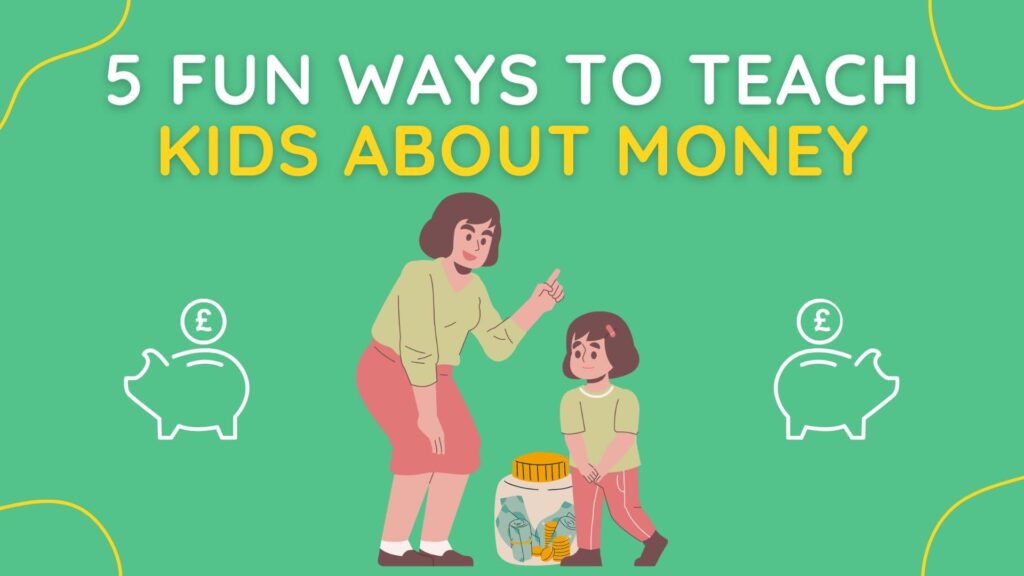
Sammie Ellard-King
I'm Sammie, a money expert and business owner passionate about helping you take control of your wallet. My mission with Up the Gains is to create a space that improves your finances, cuts your costs and helps you feel good while doing it.
We learn about money from an early age whether we’re aware of it or not.
We pick up habits from our parents, develop ambition and change the way our river runs by the decisions we make and the information we are taught.
Kids and money aren’t two words you hear often but starting to teach kids about money early on is becoming a lot more common.
The difficult is knowing how to explain money to a child. Thankfully, there’s lots of fun ways to teach kids about money which we’ll unpack more in this guide.
I’ll be honest, I love my parents, but they’re both shockingly bad with money. Honestly to this day, they both do not have a penny to their name and they’re now at an age where that’ll never change.
I’ve learnt everything I know by making every mistake going. Whilst I’ve managed to come out the other side many of us don’t and that’s testament mainly to our school systems and not bad parenting.
Putting good habits into place early on will help children better handle their cash when they grow. Of course, we don’t want you to discuss death and taxes with your two-year-old but you catch my drift.
There are ways to teach kids about money appropriately and at a level that will make an impact and allow them to understand.
In this piece, I wanted to provide parents with some ideas and hopefully leave you with the motivation to teach your kids money lessons I wish I’d had.
Podcast Episode
In this episode, Will Rainey, author of one of the best books to teach kids about money, “Grandpa’s Fortune Fables – Fun Stories To Teach Kids About Money” – joins us for a chat about how to raise financially responsible kids.
Get the full show notes and links to the episode or listen whilst you read this post by hitting the play button just below.
Table of Contents
How to teach kids about money?
Teaching kids about money comes from the parents but also those family members around them.
The more we can teach kids about money and help shape them in their childhood, the better and more well-rounded they will turn out.
When we talk about money, the more we can equip them now, the better they’ll manage in the future. They’ll be able to step out in confidence, knowing exactly what to do with their finances.
Children who do better with money usually have parents or loved ones who have spoken to them about it. Equipping them with information about spending and saving.
It’s money management for kids, but equally teaching it will help make us better with our own money habits!
GoHenry - A bank account for kids
Open an account today and get 1 month free + a free custom card
Financial literacy in schools
About 15% of an average lifetime is spent in school, which is a lot of time to learn, grow and make friends. However, many of us will spend time learning things we will never use later in life.
We’re still taught Pythagoras’ theorem over critical life lessons.
When was the last time you were questioned about the rings of Saturn?
Some of these topics might be great for a pub quiz, but there are lots of other things we can learn to assist us in our journey through life.
Did you know that financial education is only included in the UK school system as part of citizenship and maths in secondary school?
That means younger children primary school get zero teaching about finance and the money basics before they reach big school.
Older children in secondary school get the bare minimum. Financial literacy for kids is not viewed as being important. WHY!
This is criminal and clearly factors into the reason that so many people struggle with money issues. Think of the things we need to know later on in life.
How to apply for a mortgage, how a credit card works, and when you start paying tax. This is on top of basic money management tasks like budgeting.
We are huge advocates for financial literacy in schools and would like to see changes in the curriculum to teach kids basic life skills.
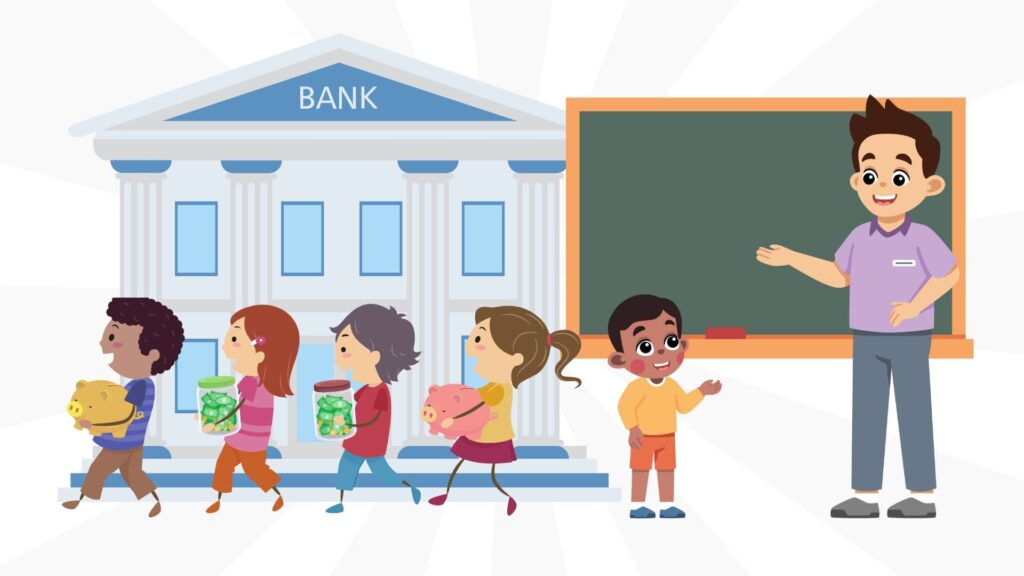
When should I speak to my child about money?
When looking at ways to teach kids about money, it is important to talk to our children. However, we must tailor our approach depending on numerous factors, including their age.
You could begin from the moment they are born with a Junior ISA and use that along the way to teach them the value of a pound.
We’ve put together a few ideas of what you can discuss with different-aged kids.
Preschoolers (3-4)
Your preschool-aged children may have seen you use money to pay for things. They might even set up a shop or cafe and play pretend at being the proprietor.
Maybe they’ve picked up your wallet or purse from the coffee table and emptied the contents. Coins, cards, and notes, all over the living room floor. Maybe even a photograph of themselves!
This is what this age is all about. Your children will touch, play with and are inquisitive about everything. They might start to ask questions and begin to identify numbers.
Infants (5-6)
The fun continues with your five and six-year-old kids. They’ll be learning numbers at school and be able to concentrate on one thing for a little bit longer.
Whilst they’ll still be playing, especially if they love make-believe, however, you’ll be able to start demonstrating that they can save their money for a new toy.
You can get them to help with the food shop, looking at the prices of items they love and helping to work out how many they can add to the shopping trolley.
This is now moving from play to show, so they can observe properly and start to take it in. Start these chats and your children will begin understanding money from a young age.
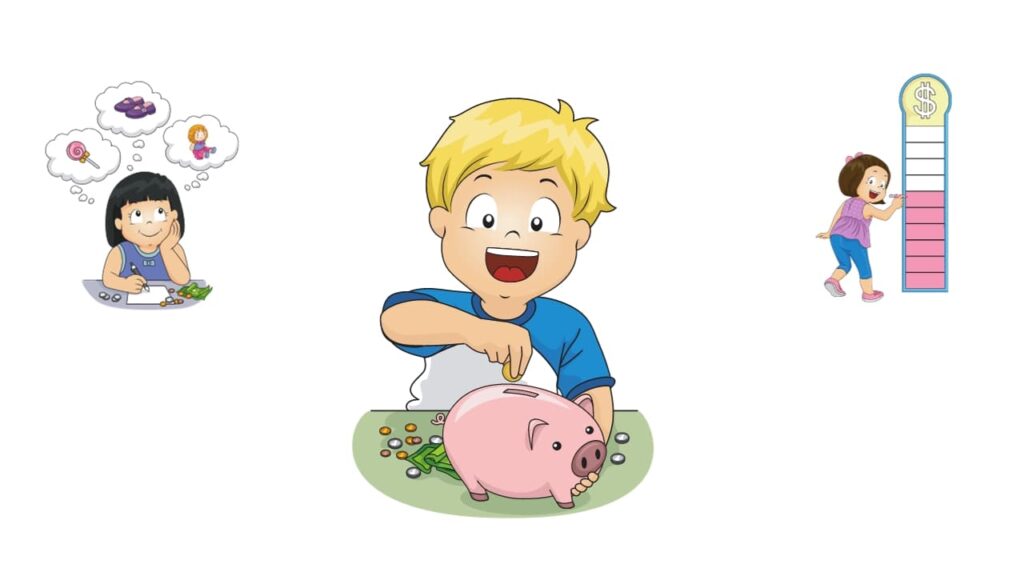
Early juniors (7-8)
When your child moves into the junior school years, they start to know what they need and what they want.
It might blend into the same thing occasionally; however they will begin to understand the difference. This is a great age to start chatting about their own desires with money.
What do they want to save up for or use their birthday money towards? Do they want to save it for the longer-term goal next month or spend it on those sweets they can enjoy today?
You could even look at how they can earn cash. Weekly pocket money from doing certain things around the house, perhaps?
Late juniors (9-10)
You’ll notice your children want to start having a little more independence. Deciding what they want to spend money on, hopefully choosing what to save their money towards.
Getting them to focus on responsibility is a big life lesson. Ensuring they can be responsible with their cash will not only settle your mind but also set them up for the future. Sensible and independent decision-making is important.
High school & teenagers (11+)
The freedom and higher cost of the teenage years start around high school time. It might begin with them wanting a mobile phone and paying the monthly bill and progress to the clothes that they want to dress in.
A few years later they might start thinking about driving lessons. They might even want to start making money as a teenager to have a wage from a part-time or weekend job.
When I was 15, I made money online buying clothes in bulk and re-selling them on eBay.
You can assist them in looking after their wage and giving them some financial responsibilities, all whilst setting the right example you want them to follow.
They might even be looking at university where they live away from home and start to have sole responsibility for their finances. This is really a time of life when cash becomes more important.
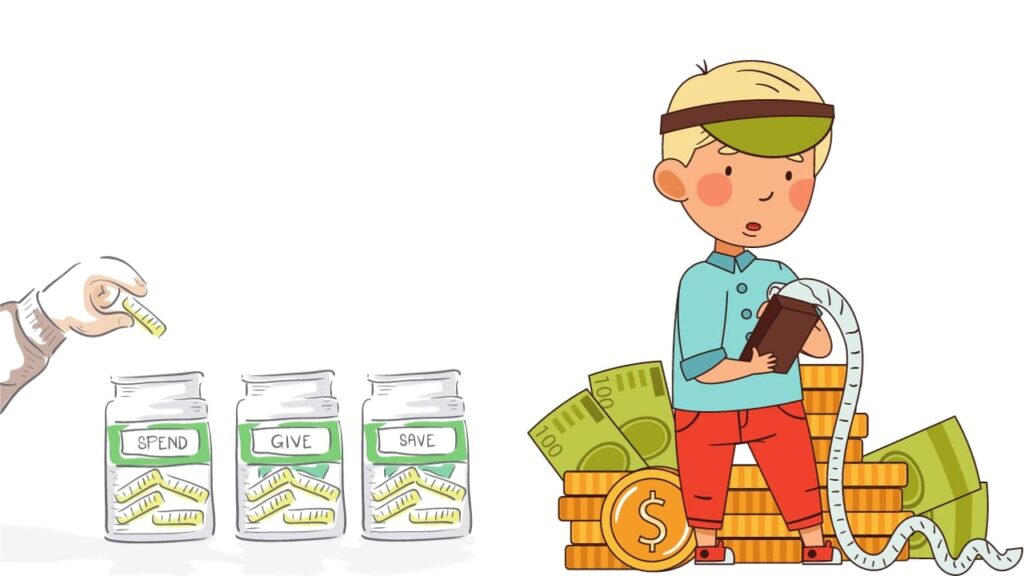
When your children have grown up
When your children grow up, you don’t grind to a halt having conversations about finances with them. In fact, you might have more chats about cash.
It could be talking about rental agreements or how to save for a mortgage. Maybe they are struggling with credit card debt, or you want to talk to them about inheritance for when the inevitable happens.
Money is something that needs to be talked about every now and again throughout the seasons of life.
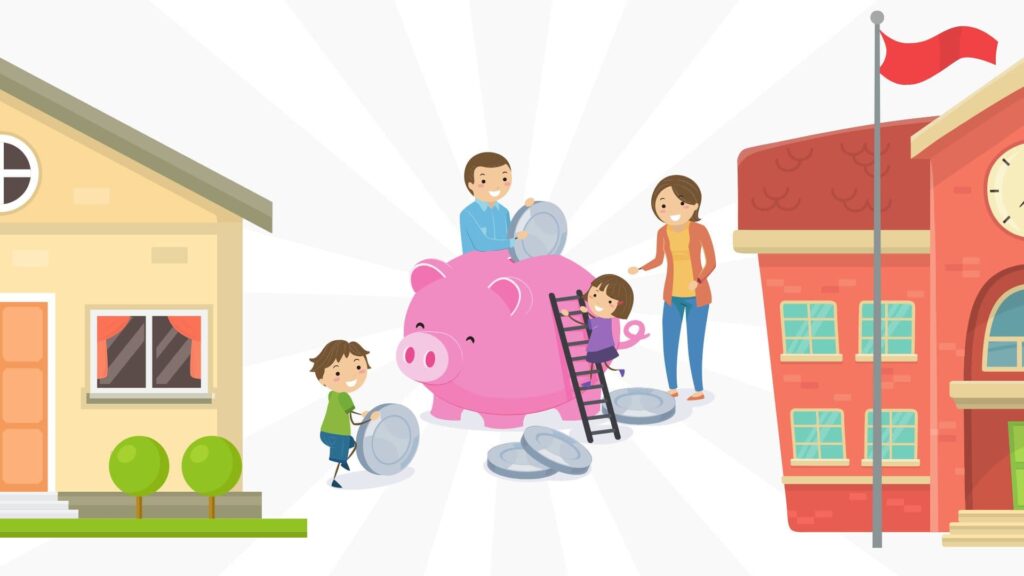
5 ways you can teach kids about money
How do we teach money management skills to our children? What are some ways to teach kids about money, looking after it, spending it wisely and saving it well?
Keeping it fun is important. If it seems like a chore, they will quickly switch off, and it will be a wasted time and effort.
1) Watching and doing
Children are natural mimics and learn extensively by observing—especially from their parents. Your financial habits, whether it’s savvy shopping or prudent saving, can become their blueprint.
When at the supermarket, talk them through your choices, like opting for cost-effective brands, and discuss the reasons behind these decisions.
Turn financial activities into interactive sessions. Let them hand over the money sometimes or count out cash for significant expenses.
It’s more than a game; it’s preparation for understanding the cost of living and the value of experiences, such as family holidays.
Be transparent about why you work and the expenses it covers, which links the concept of labour to reward.
Additionally, use their experiences, such as impulsive purchases following an advert or peer influence, to teach them about the fleeting nature of wants versus the enduring satisfaction of thoughtful spending.
Your consistent example is the most powerful teaching tool you have in instilling wise money habits in your children.
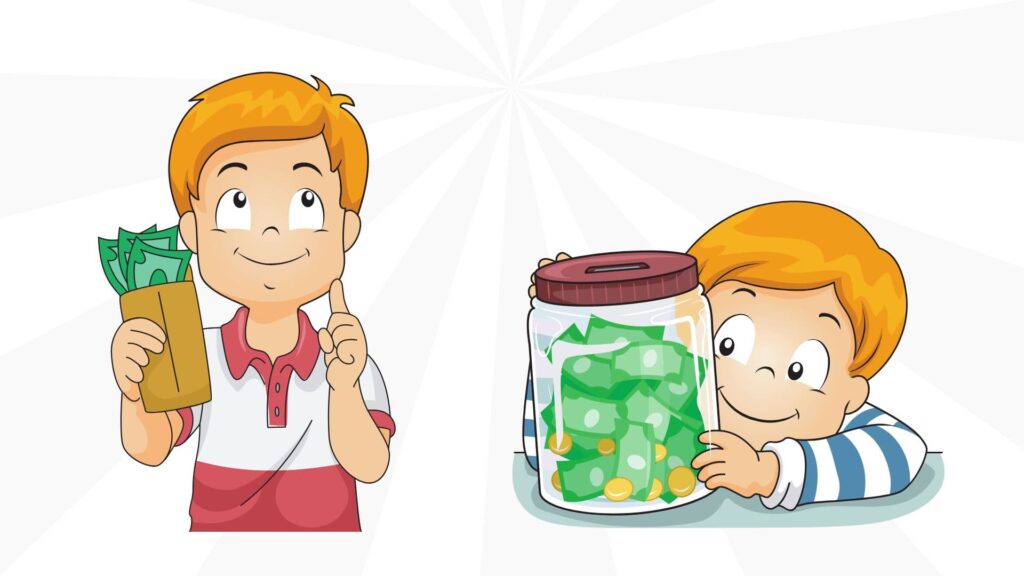
2) What it money used for?
When teaching kids about money, it’s crucial to explain its uses. Money is the currency we exchange for necessities like food, shelter, and clothing. It’s also for the extras, like transport and leisure activities.
Understanding that money is earned and saved, rather than spontaneously available, is a fundamental lesson.
To bring this to life, involve them in spending, such as paying for the weekly groceries or covering a bus fare. This tangible exchange helps them grasp the value of money.
Alternatively, challenge them to make £10 stretch for a day’s activities, which teaches them about making choices and prioritising spending.
Introduce a piggy bank or a transparent container for saving. Whether it’s from gifts or chores, they can watch their savings grow and even set a goal for what they’re saving towards.
This not only educates them about saving but also planning and delayed gratification. Involving them in your saving strategies can further their understanding and set a foundation for financial literacy.
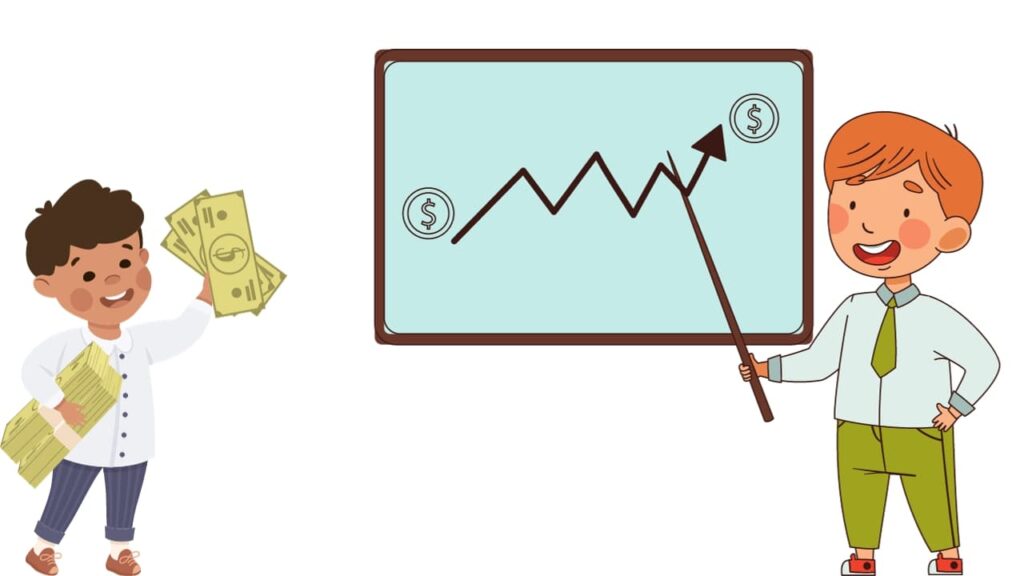
3) Familiarity & hands-on
Whilst your little ones might play with pretend money when they are little, they need to handle real cash. Some kids don’t know what a debit card is, for example.
Let them get to grips with it and be familiar with it.
By handling cash, it becomes familiar. This means that they will have confidence in it.
Put some coins on the table and get them to put them in order or value. If they are old enough to understand numbers, they should be able to work this out.
You could even play a game where you have some sweets, and you can sell them to them for a certain amount of money. Getting them to figure out how much to hand over starts putting into practice future transactions.
Being as hands-on as possible from an early age will ensure familiarity with money.
4) Incorporate the digital world
When we look at ways to teach kids about money, we need to look at the here and now. Times have changed.
Money goes way beyond notes and coins, especially in a world of contactless cards and cryptocurrency. We must incorporate the digital world into our ways of teaching kids about money.
You can introduce children to bank accounts and savings by looking at the likes of GoHenry and HyperJar.
Having bank cards linked to apps so they can see money on their terms certainly helps break down those walls surrounding finance.
Your children’s financial education depends on them getting to grips with new technologies that they will be faced with when they grow up.
5) Learn to budget
Being able to budget now will help them when times are tough as an adult. If you can get them to watch the pennies and pounds now, they’ll automatically do it when they get older.
Maybe get them to budget for buying something they’ve been after for a while. It could be a new t-shirt, a video game or a trip out to a foot golf park.
Sit with them and help them figure out how much money they have. This can include pocket money. If the game costs £10 and they get £3 a week, they can figure out how much they need to put away for how long before they can buy the item.
Even with that information, they might decide to spend £2 of what they save on some sweets one weekend. That is a choice, and they will realise that the game is slightly further away when they dip into their savings.
A simple activity like this can be fantastic for their future. Budgeting properly is a life skill we all need and possibly the most important of the ways to teach kids about money.
GoHenry - A bank account for kids
Open an account today and get 1 month free + a free custom card
Family Money Management
Many of us were not able to understand money from a young age. So whilst we might want to provide financial literacy for kids in our care, we simply might not have the information needed ourselves.
Perhaps we’ve found ourselves in money difficulties over the years.
If we want to equip ourselves with the knowledge we need to pass on to our children, we need to read up, study and get help. There are lots of useful websites and blogs online, all with great financial information.
You can also attend a CAP money course run by Christians Against Poverty, where you will learn money management skills.
Be sure to better yourself before looking at ways to teach children about money. Old habits need to be pushed aside and new ones put in place. That way, you will be able to pass on the financial wisdom for a better future properly.
Share this article with friends
Disclaimer: Content on this page is for informational purposes and does not constitute financial advice. Always do your own research before making a financially related decision.

